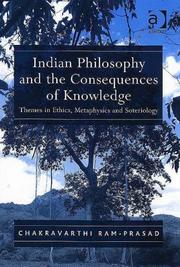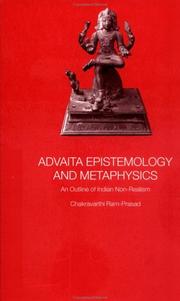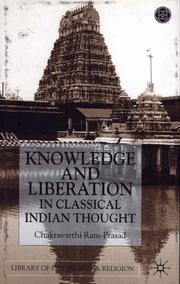| Listing 1 - 10 of 10 |
Sort by
|

ISBN: 9780754654568 0754686760 9780754686767 0754654567 1317117433 9781317117438 1317117425 9781317117421 1281099236 9781281099235 9786611099237 6611099239 9781315588308 9781317117414 1315588307 Year: 2007 Publisher: Aldershot, England Burlington, VT Ashgate Pub.
Abstract | Keywords | Export | Availability | Bookmark
 Loading...
Loading...Choose an application
- Reference Manager
- EndNote
- RefWorks (Direct export to RefWorks)
This book presents a collection of essays, setting out both the special concern of classical Indian thought and some of its potential contributions to global philosophy. It presents some key arguments made by different schools about this special concern: the way in which attainment of knowledge of reality transforms human nature in a fundamentally liberating way. It then goes on to look in detail at two areas in contemporary global philosophy - the ethics of difference, and the metaphysics of consciousness - where this classical Indian commitment to the spiritually transformative power of know
Philosophy, Indic. --- Knowledge, Theory of. --- Epistemology --- Theory of knowledge --- Philosophy --- Psychology --- Indic philosophy --- Philosophy, East Indian --- Hindu philosophy
Book
ISBN: 9781441182654 9781441154644 9781441140425 9781441176813 1441154647 1441182659 1441176810 1441140425 Year: 2013 Publisher: New York Bloomsbury Academic
Abstract | Keywords | Export | Availability | Bookmark
 Loading...
Loading...Choose an application
- Reference Manager
- EndNote
- RefWorks (Direct export to RefWorks)
The Gita is a central text in Hindu traditions, and commentaries on it express a range of philosophical-theological positions. Two of the most significant commentaries are by Sankara, the founder of the Advaita or Non-Dualist system of Vedic thought and by Ramanuja, the founder of the Visistadvaita or Qualified Non-Dualist system. Their commentaries offer rich resources for the conceptualization and understanding of divine reality, the human self, being, the relationship between God and human, and the moral psychology of action and devotion. This book approaches their commentaries through a study of the interaction between the abstract atman (self) and the richer conception of the human person. While closely reading the Sanskrit commentaries, Ram-Prasad develops reconstructions of each philosophical-theological system, drawing relevant and illuminating comparisons with contemporary Christian theology and Western philosophy. - See more at: http://www.bloomsbury.com/uk/divine-self-human-self-9781441182654/#sthash.Z0aFk0fY.dpuf
Hindu philosophy. --- Hinduism --- Doctrines --- Hindu philosophy --- 291.1 --- 294.58 --- Philosophy, Hindu --- Philosophy --- Philosophy, Indic --- 291.1 Godsdienstfilosofie --- Godsdienstfilosofie --- Religions --- Brahmanism --- 294.58 Heilige boeken uit het Hindoeïsme: Mahabharata; Bhagavatgita; Dharma Sutra; Sutra's; Purana's --- Heilige boeken uit het Hindoeïsme: Mahabharata; Bhagavatgita; Dharma Sutra; Sutra's; Purana's --- Rāmānuja, --- Śankara. --- Cankara --- Śankarāchārya --- Śankarācārya --- Rāmānujāchārya, --- Irāmān̲ujar, --- Etirājar, --- Emperumān̲ār, --- Tiruppāvai Jīyar, --- Uṭaiyavar, --- Rāmānujulu, --- Rāmānujācārya, --- Hinduism - Doctrines - Comparative studies. --- Śaṅkarācārya. --- Sankaracarya. --- Ramanuja,

ISBN: 1138878944 1315029391 1136868909 9781136868900 0700716041 9780700716043 0700716041 9780700716043 9781315029399 9781136868979 9781136869044 9781138878945 1136868976 Year: 2002 Publisher: London
Abstract | Keywords | Export | Availability | Bookmark
 Loading...
Loading...Choose an application
- Reference Manager
- EndNote
- RefWorks (Direct export to RefWorks)
Based on original translations of passages from the works of three major thinkers of the classical Indian school of Advaita (Sankara, Vacaspati and Sri Harsa), but addressing issues found in Descartes, Berkeley, Hume, Kant, Wittgenstein and contemporary analytic philosophers, this book argues for a philosophical position it calls 'non-realism'. This is the view that an independent, external world must be assumed if the features of cognition are to be explained, but that it cannot be proved that there is such a world, independently of an appeal to cognition itself. This position is constructed
Advaita. --- Knowledge, Theory of. --- Metaphysics. --- Philosophy --- God --- Ontology --- Philosophy of mind --- Epistemology --- Theory of knowledge --- Psychology --- Hindu philosophy --- Hinduism --- Pantheism --- Vedanta
Book
ISBN: 0191862231 019255672X 0192556738 0198823622 Year: 2018 Publisher: Oxford University Press USA - OSO
Abstract | Keywords | Export | Availability | Bookmark
 Loading...
Loading...Choose an application
- Reference Manager
- EndNote
- RefWorks (Direct export to RefWorks)

ISBN: 0333927478 Year: 2000 Publisher: Basingstoke : Palgrave,
Abstract | Keywords | Export | Availability | Bookmark
 Loading...
Loading...Choose an application
- Reference Manager
- EndNote
- RefWorks (Direct export to RefWorks)
Book
ISBN: 1441176810 Year: 2013 Publisher: New York : Bloomsbury Academic,
Abstract | Keywords | Export | Availability | Bookmark
 Loading...
Loading...Choose an application
- Reference Manager
- EndNote
- RefWorks (Direct export to RefWorks)
The Gita is a central text in Hindu traditions, and commentaries on it express a range of philosophical-theological positions. Two of the most significant commentaries are by Sankara, the founder of the Advaita or Non-Dualist system of Vedic thought and by Ramanuja, the founder of the Visistadvaita or Qualified Non-Dualist system. Their commentaries offer rich resources for the conceptualization and understanding of divine reality, the human self, being, the relationship between God and human, and the moral psychology of action and devotion. This book approaches their commentaries through a st
Hindu philosophy. --- Hinduism --- Doctrines --- Śaṅkarācārya. --- Rāmānuja,
Book
ISBN: 9781138541399 Year: 2019 Publisher: London : Routledge, Taylor and Francis,
Abstract | Keywords | Export | Availability | Bookmark
 Loading...
Loading...Choose an application
- Reference Manager
- EndNote
- RefWorks (Direct export to RefWorks)
"Dialogue is a recurring and significant component of Indian religious and philosophical literature. Whether it be as a narrative account of a conversation between characters within a text, as an implied response or provocation towards an interlocutor outside the text, or as a hermeneutical lens through which commentators and modern audiences can engage with an ancient text, dialogue features prominently in many of the most foundational sources from classical India. Despite its ubiquity, there are very few studies that explore this important facet of Indian texts. This book redresses this imbalance by undertaking a close textual analysis of a range of religious and philosophical literature to highlight the many uses and functions of dialogue in the sources themselves and in subsequent interpretations. Using the themes of encounter, transformation and interpretation - all of which emerged from face-to-face discussions between the contributors of this volume - each chapter explores dialogue in its own context, thereby demonstrating the variety and pervasiveness of dialogue in different genres of the textual tradition. This is a rich and detailed study that offers a fresh and timely perspective on many of the most well known and influential sources from classical India. As such, it will be of great use to scholars of religious studies, Asian studies, comparative literature, and literary theory"--
Dialogue. --- Philosophy, Indic. --- Religious literature, Indic --- History and criticism. --- India --- Religion.
Book
ISBN: 0367786729 1138541397 1351011111 135101112X 1351011138 9781138541399 9781138541399 Year: 2019 Publisher: Abingdon: Routledge,
Abstract | Keywords | Export | Availability | Bookmark
 Loading...
Loading...Choose an application
- Reference Manager
- EndNote
- RefWorks (Direct export to RefWorks)
Dialogue is a recurring and significant component of Indian religious and philosophical literature. Whether it be as a narrative account of a conversation between characters within a text, as an implied response or provocation towards an interlocutor outside the text, or as a hermeneutical lens through which commentators and modern audiences can engage with an ancient text, dialogue features prominently in many of the most foundational sources from classical India. Despite its ubiquity, there are very few studies that explore this important facet of Indian texts. This book redresses this imbalance by undertaking a close textual analysis of a range of religious and philosophical literature to highlight the many uses and functions of dialogue in the sources themselves and in subsequent interpretations.Using the themes of encounter, transformation and interpretation – all of which emerged from face-to-face discussions between the contributors of this volume – each chapter explores dialogue in its own context, thereby demonstrating the variety and pervasiveness of dialogue in different genres of the textual tradition.This is a rich and detailed study that offers a fresh and timely perspective on many of the most well-known and influential sources from classical India. As such, it will be of great use to scholars of religious studies, Asian studies, comparative literature and literary theory.
Dialogue (littérature) -- Inde --- Littérature religieuse indienne (de l'Inde) --- Philosophie -- Inde --- Actes de congrès --- Dialogue. --- Philosophy, Indic. --- Religious literature, Indic --- History and criticism. --- India --- Religion.
Book
ISBN: 9781409443544 140944354X 9781138261792 9781315586809 9781317121916 9781317121923 1409456625 1315586800 1317121929 9786613654540 1409443558 1280677619 1138261793 9781409443551 Year: 2012 Publisher: London: Routledge,
Abstract | Keywords | Export | Availability | Bookmark
 Loading...
Loading...Choose an application
- Reference Manager
- EndNote
- RefWorks (Direct export to RefWorks)
The debates between various Buddhist and Hindu philosophical systems about the existence, definition and nature of self, occupy a central place in the history of Indian philosophy and religion. These debates concern various issues: what 'self' means, whether the self can be said to exist at all, arguments that can substantiate any position on this question, how the ordinary reality of individual persons can be explained, and the consequences of each position. At a time when comparable issues are at the forefront of contemporary Western philosophy, in both analytic and continental traditions (as well as in their interaction), these classical and medieval Indian debates widen and globalise such discussions. This book brings to a wider audience the sophisticated range of positions held by various systems of thought in classical India.
Hindu philosophy. --- Buddhist philosophy. --- Ātman. --- Anātman. --- Hinduism --- Buddhism --- Relations --- Buddhism. --- Hinduism. --- Hindu philosophy --- Buddhist philosophy --- Ātman --- Anātman --- Hinduism - Relations - Buddhism --- Buddhism - Relations - Hinduism --- Ātman. --- Anātman.
Book
ISBN: 9781350234819 1350234818 1350167770 9781350167773 Year: 2023 Publisher: New York: Bloomsbury Academic,
Abstract | Keywords | Export | Availability | Bookmark
 Loading...
Loading...Choose an application
- Reference Manager
- EndNote
- RefWorks (Direct export to RefWorks)
Drawing on a rich variety of premodern Indian texts across multiple traditions, genres, and languages, this collection explores how emotional experience is framed, evoked, and theorized in order to offer compelling insights into human subjectivity.Rather than approaching emotion through the prism of Western theory, a team of leading scholars of Indian traditions showcases the literary texture, philosophical reflections, and theoretical paradigms that classical Indian sources provide in their own right. The focus is on how the texts themselves approach those dimensions of the human condition we may intuitively think of as being about emotion, without pre-judging what that might be. The result is a collection that reveals the range and diversity of phenomena that benefit from being gathered under the formal term “emotion”, but which in fact open up what such theorisation, representation, and expression might contribute to a cross-cultural understanding of this term. In doing so, these chapters contribute to a cosmopolitan, comparative, and pluralistic conception of human experience.Adopting a broad phenomenological methodology, this handbook reframes debates on emotion within classical Indian thought and is an invaluable resource for researchers and students seeking to understand the field beyond the Western tradition.
| Listing 1 - 10 of 10 |
Sort by
|

 Search
Search Feedback
Feedback About UniCat
About UniCat  Help
Help News
News